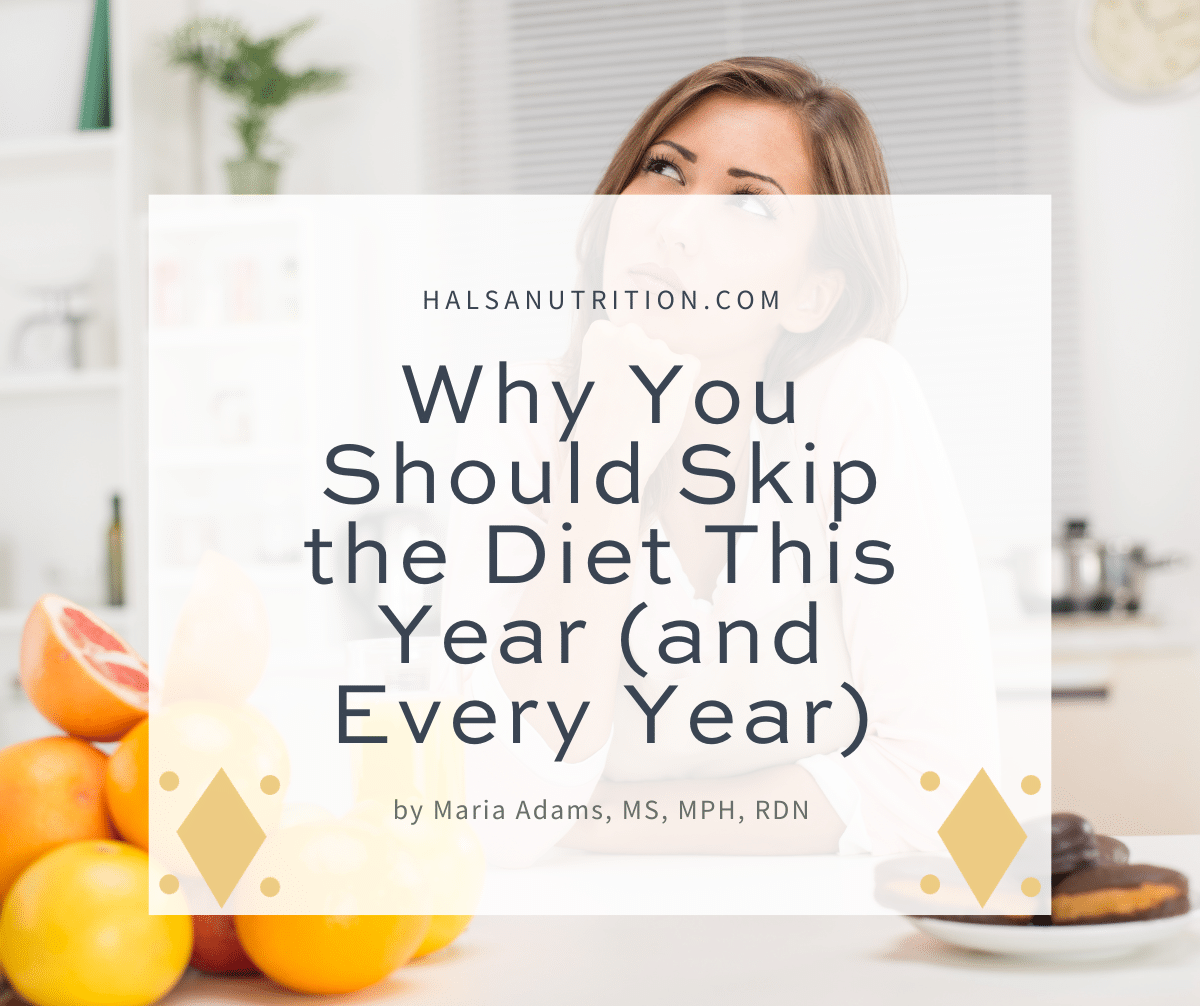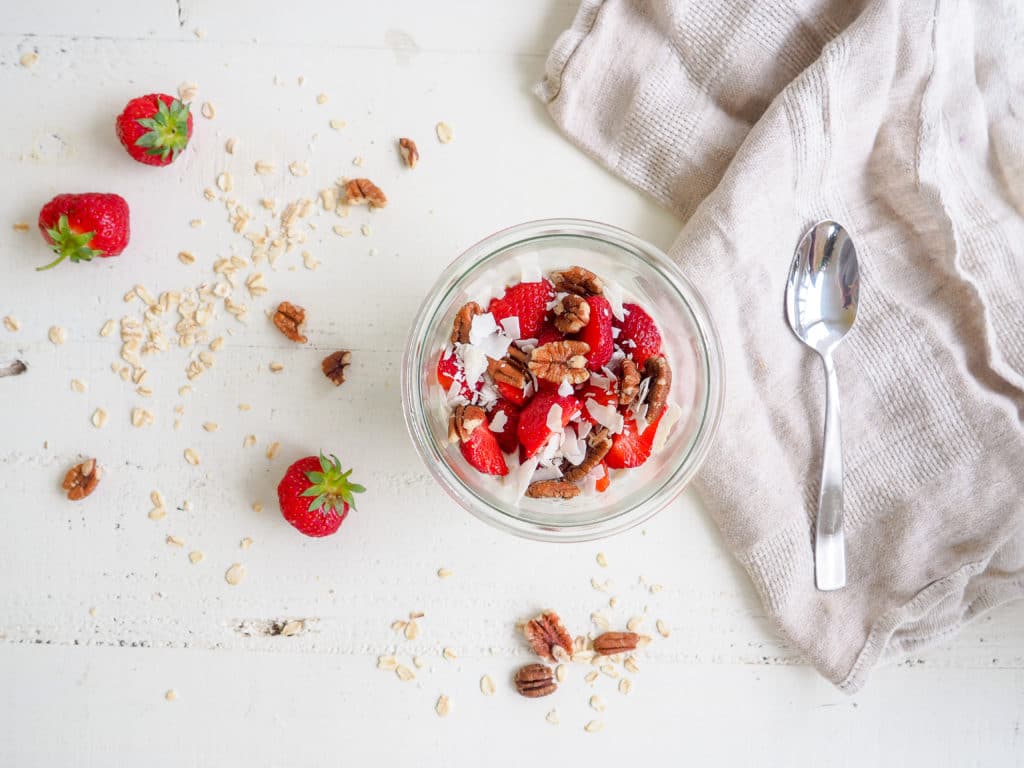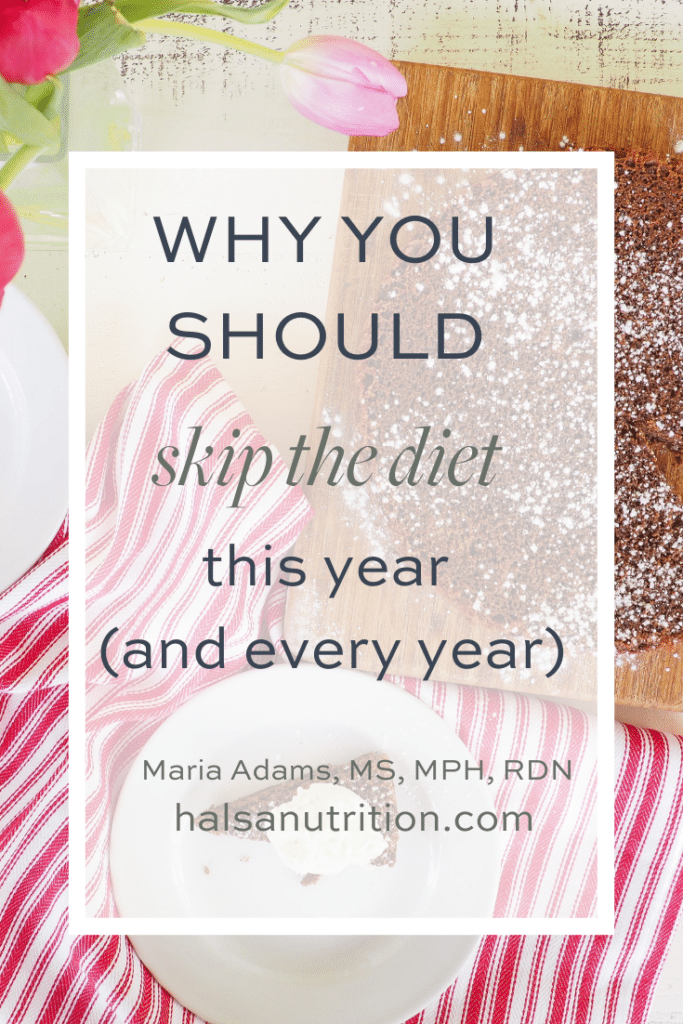
Why You Should Skip the Diet this Year (and Every Year)
Here’s why you should skip the diet this year–and every year, whether it’s in the form of a diet, cleanse, plan, protocol, reboot, or reset.
Are you ready to ditch the diet for good? Or maybe curious to learn more about why you should. Then you have come to the right place.
Over the past few years, I have spent a lot of time learning about how dieting and diet culture is more harmful than helpful. Even the seemingly well-meaning wellness culture is filled with diets. It has been eye-opening, to say the least.
Why It’s Time to Ditch the Diet
Anti-diet dietitian Christy Harrison, calls dieting “the life thief.” And I couldn’t agree more. Not only does dieting take physical time, but it also robs you of so much mental energy–time that could have been spent in so many other meaningful ways.
When most of us think of “diets” we think of temporary eating plans or restrictions that will help us lose weight. Dieting almost always has a negative association; it’s not something that brings joy or that we want to keep up with for the rest of our life. Sure, dieting may bring joy and excitement when we first lose weight or are feeling “good” because we are “being good” and adhering to a plan. However, usually, those feelings are short-lived. Research shows that most people who intentionally lose weight gain it back within 5 years. In other words, long-term weight loss is generally not sustainable.
Our bodies were designed to protect us from famine, so it makes sense that it’s easier to gain or hold on to weight than lose it. Moreover, there is a theory that says we all have a genetically predetermined weight range. Why should you think a natural part of your body’s cycle is something to correct?
Of course, all this doesn’t mean you should stop eating nourishing foods and taking care of yourself, it just means that you should stop focusing on the number on your scale and/or obsessing over food. Instead, focus on how foods make you feel. Foods like chocolate have their benefits and as part of a nourishing meal can be better for your mental and physical health than a restrictive diet has. If you want to make dietary changes, make them small (one habit at a time), positive (e.g., adding foods not taking away), and flexible.
You can learn about intuitive eating from this previous blog post.

Sneaky Diets
Then there is the sneaky wellness diet. Whether it’s marketed as a “lifestyle plan,” a “wellness reboot,” or “clean eating guidelines,” if there are rules or restrictions, it’s a diet. Even if the goal isn’t necessarily to lose weight. (And just so you know, clean eating is not a thing–sure it’s great to eat more whole, unprocessed foods, but suggesting that some foods are cleaner and therefore eating them makes you healthier is inaccurate. Read more about clean eating here.)
These sneaky wellness diets have boomed over the past decade. Clearer skin? Brain fog? Bloating? There is a diet book, diet expert, and diet plan for that. But are all those restrictions really necessary? And how do you feel adhering to them? How do they affect your family meals? Your grocery bill? Before you start another diet or plan consider talking to a Registered Dietitian for more individualized advice.

When Diets are Necessary
Note that sometimes changes to what we eat are necessary, for example, if someone has a diagnosed food allergy or intolerance. Likewise, people with certain medical conditions such as diabetes or hypertension may benefit from changes to their diet. In these situations, it’s important to work with a dietitian to make sure you can find a way of eating that is tailored to your needs and helps you thrive.
Many people choose to change the way they eat for ethical or environmental reasons, this is okay and different from doing it for a health reason. However, if this is you, make sure you are not doing it to lose weight. Also, you may want to reconsider any strict, rigid rules about eating if you know you are prone to disordered eating or obsessive food thoughts. Does it have to be black and white?
What About if You Need to Lose Weight?
First of all, know that it’s not your weight that is the issue. It’s weight stigma. It’s diet culture telling you that you should be at a lower weight. Contrary to what we have been taught, body weight does not determine health status. You can, in fact, have health at any size. And you can practice healthy behaviors at any size. While this is an area of knowledge that has yet to catch on mainstream, the number of people who support Health at Every Size® (HAES®) is steadily growing and I urge you to read up on HAES®.
This article by Lindo Bacon explains the need for a shift away from our focus on weight and why a HAES® approach is more effective at improving health outcomes than prescribing weight loss. To sum it up, it’s time to stop using the BMI chart and recommending diets and instead look at health behaviors, social equality, and access to care.
That said, I understand if you still want to lose weight. And you, of course, have every right to try and do so. But I urge you to make your overall health behaviors and habits the focus–not your weight. Show kindness to yourself in all ways–from eating veggies to getting sleep to moving/exercising in ways you enjoy to practicing stress reduction to eating cake without guilt. Your body will thank you.
Other Posts You Might Like
- How to Stop Dieting in the New Year
- HAES – A Better Approach to Health and Weight
- Letting Go of the Diet Mentality
- What Started the Intuitive Eating Movement?
- Why You Should Skip the Diet this Year (and Every Year)
- What to know about weight loss drugs like Ozempic and Saxenda
Resources:
- Christy Harrison – author of “Anti-Diet”
- Intuitive Eating – by Evelyn Tribole and Elyse Resch
- Rebecca Stritchfield – author of “Body Kindness”
About the Author
Maria Adams, MS, MPH, RDN is a registered dietitian and Certified Intuitive Eating Counselor. Maria takes a weight-inclusive approach and helps individuals rediscover the joy of food by helping them heal from chronic dieting and disordered eating. She holds a Bachelor of Science Degree in Nutrition Science, a Master of Science in Nutrition Communication, and a Master of Public Health.

Leave a Reply